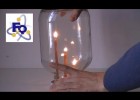Cargando...
Recursos educativos
-
Nivel educativo
-
Competencias
-
Tipología
-
Idioma
-
Tipo de medio
-
Tipo de actividad
-
Destinatarios
-
Tipo de audiencia
-
Creador
-

Energy Use in Buildings: "Use it better, use it less"
EducaMadrid Organización
- 4300 visitas
On average, we spend 90% of our time inside buildings in Europe. The energy that we consume there accounts for 40% of total European Union consumption. That’s more than the share of industry and…
-

Complete. Energy
EduBook Organización
- 1879 visitas
Complete the sentences with the correct words: fuels deformations sources hot volume renewable Sun Heat thermal equilibrium up movements coal power On Earth, most of the energy on earth comes from the .…
-

Investigate. Electricity
EduBook Organización
- 1749 visitas
Over three-quarters of the electricity that we consume in the developed world comes from non-renewable energy sources. Thermal power stations burn fossil fuels. Nuclear power stations use uranium. Why…
-

Learn. Reading graphs
EduBook Organización
- 1617 visitas
Graphs and charts are helpful tools in geography because they provide us with a lot of information very quickly. It is very important to be accurate and precise when reading a graph, and to explain as…
-

Razona. Materiales metálicos
EduBook Organización
- 1406 visitas
El peso de un vehículo condiciona su consumo de carburante. Se estima que el hecho de reducir 100 kg la masa, reduce el consumo unos 0,3 L cada 100 km. Un automóvil de 2000 kg consume 6,5 L de…
-

Tres velas y un misterio
Eva Ribes Organización
- 7 lo usan
- 2915 visitas
Experimento de física y química sobre combustión realizado con un recipiente cerrado y tres velas de diferente altura. La combustión de las velas consume oxígeno y produce dióxido de carbono y…
Te estamos redirigiendo a la ficha del libro...



